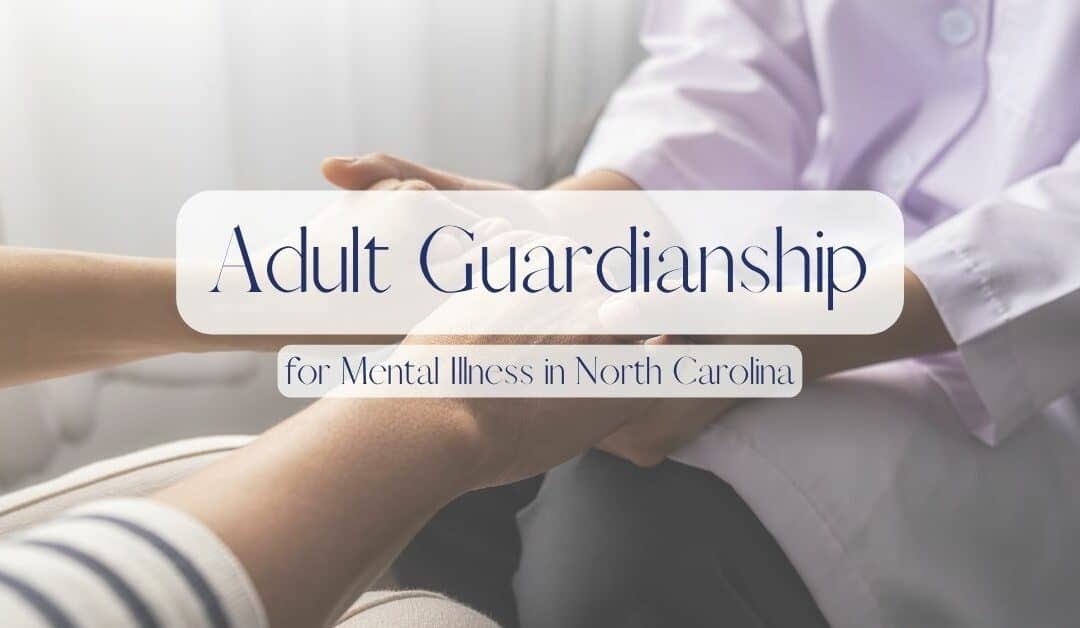Mental illness can strike anyone at any time, and when it does, the effects can be devastating for both the individual and their loved ones. If the individual did not plan ahead by naming a power of attorney, you may need to file a petition for guardianship with the court. Let’s look at how guardianship works for adults with mental illness in North Carolina.
What is Guardianship for Adults with Mental Illness?
Guardianship is a legal arrangement in which the court gives an individual the decision-making authority for another person. In North Carolina, a court can grant guardianship over an adult with mental illness if it finds that the individual cannot take care of themselves or their finances due to a mental illness. In that case, the court declares the person “incompetent,” a legal term meaning an inability to care for yourself or your finances.
The guardianship may be temporary or permanent, and it can be limited to specific areas such as financial matters or healthcare decision-making. The court appoints as limited guardianship as possible to help the individual continue with as much independence as possible for their mental health condition.
Who Can Be a Guardian?
In North Carolina, any adult over 18 can petition to be appointed as a guardian, as long as they are not currently under guardianship themselves. A family member is usually preferred, but this is not always possible or appropriate.
The court will appoint whoever it believes is in the individual’s best interests, taking into account factors such as the relationship between the guardian and the individual, whether the guardian lives nearby, and whether the guardian has the time and resources to take on this responsibility.
How Does Guardianship Work?
The guardianship process generally begins when a loved one files a petition with the court stating they cannot take care of themselves or their finances or property. A hearing will then be held, at which both sides will have an opportunity to present evidence and argue their case. Working with a guardianship attorney can help you get the best results when filing a petition or attending a hearing.
If the court grants guardianship, the guardian receives authority to make decisions for the individual ruled incompetent.
Is Guardianship Right for Adults with Mental Illness?
According to NCCourts.gov, “North Carolina law favors less restrictive alternatives to guardianship if possible.” Some of the alternatives that can replace the need for guardianship include:
Durable Power of Attorney and Health Care Power of Attorney
A competent adult may work with an estate planning attorney to delegate someone they trust as their power of attorney. A durable general power of attorney can manage someone’s affairs even if they become incapacitated or incompetent to manage financial, medical, or other matters in the future. An attorney can assist you in drawing up these documents.
A springing power of attorney only goes into effect when an event happens, such as if a doctor declares you incompetent.
Advance Directive for Natural Death (“Living Will”)
Advance directives give instructions about the medical treatments individuals approve of for themselves. You can work with your estate planning attorney to draw up advance directives and file them with the North Carolina Secretary of State.
Advance Directives for Mental Health Treatment
Advance directives give instructions about the mental healthcare treatments individuals approve of for themselves. You can work with your estate planning attorney to draw up mental health treatment advance directives and file them with the North Carolina Secretary of State.
Representative Payee
When individuals receive specific state or federal benefits but cannot manage their finances well, the managing agency assigns a representative payee. This representative payee receives and manages the funds for the individual’s benefit. Examples include Social Security income, supplemental security income, and veteran’s benefits.
Joint Bank Accounts
You can set up joint bank accounts that require both signatures for withdrawals or have automatic payment options to help an individual manage money.
Special Needs Trust
If you have resources to help an individual with mental health issues, you can set up a special needs trust. A special needs trust holds money for the incompetent individual. It also allows them to maintain eligibility for needs-based public benefits such as health insurance, transportation, and living arrangements. Your estate planning attorney can help you draw up a special needs trust.
Home Health Care
Home health care agencies can help individuals with mental illness with the activities of daily living, like dressing, bathing, cooking, and cleaning.
Family or Community Support
Individuals with mental illness may live independently without a guardian if organizations or individuals in the community step in and help with their finances, dinners, or medications. Sometimes, an individual only needs a couple of people they can trust for guidance when making money decisions.
We Can Help
At Cape Fear Law, our experienced estate planning and guardianship attorneys help individuals file for guardianship over a loved one with a mental illness. We also assist with the guardianship administration with the court system in NC and drawing up power of attorney documents. These legal frameworks put the help you make the best decisions for an adult with mental illness. Give us a call today to find out how we can help you plan for your future.

